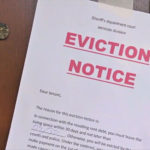A reference of South Carolina Eviction Laws, and steps of the South Carolina eviction process for landlords and renters, updated 2021.
- What are the reasons for eviction under South Carolina eviction laws?
- Nonpayment of rent (S.C. Code Ann. § 27-40-710(B))
- Health and safety violation (S.C. Code Ann. § 27-40-510)
- Illegal activity (S.C. Code Ann. § 27-40-540)
- Non-compliance with the lease agreement (S.C. Code Ann. § 27-40-710(A))
- Tenant remains in possession of the rental unit after the lease term without the owner’s permission (S.C. Code Ann. § 27-40-770)
- What notice do South Carolina eviction laws require that landlords provide tenants before starting the eviction process?
- For evictions based on non-payment of rent, the landlord must provide a 5-day notice. If the tenant pays the rent within the five days, they are not evicted. (S.C. Code Ann. § 27-40-710(B)).
- For evictions based on a violation that materially affects health and safety or the condition of the property, the landlord can evict the tenant immediately. (S.C. Code Ann. § 27-40-510)
- For evictions based on conducting illegal activity on the property, the landlord can evict the tenant immediately. (S.C. Code Ann. § 27-40-540)
- For evictions based on non-compliance with the lease agreement, the landlord must provide a 14-day notice to the tenant. The notice must state the nature of the breach and what the tenant must do to correct it to avoid eviction. (S.C. Code Ann. § 27-40-710(A))
- For evictions based on remaining in possession of the rental unit beyond the period of the lease without the owner’s permission, the landlord must provide a notice of 7-days for a week-to-week tenancy. For a month-to-month tenancy, the landlord must provide a 30-day notice. If the tenant remains in possession of the rental unit beyond the agreed-upon term not in good faith, the landlord can take legal action against the tenant and recover reasonable attorney’s fees. If the holdover is a willful violation of the law or the rental agreement, the landlord can also recover up to three months’ rent or twice the actual damages they suffered, whichever is greater. (S.C. Code Ann. § 27-40-770).
- Do South Carolina eviction laws allow landlords to use “self-help eviction” methods, such as locking a tenant out of the rental unit or shutting off the utilities?
- No. South Carolina law prohibits self-help measures. If the landlord unlawfully removes or excludes the tenant from the property or interrupts essential services to the rental property, the tenant can recover damages up to two times the actual damages or three months’ rent, whichever is greater, along with reasonable attorney’s fees. (S.C. Code Ann. § 27-40-660).
South Carolina Eviction Process: Step-by-Step
The eviction process in South Carolina is called “ejectment.” It involves the following steps:
- The landlord serves the eviction notice. The landlord must give the appropriate eviction notice to the tenant that notifies the tenant that they are being evicted and gives them a deadline to cure, if applicable.
- The landlord waits for the tenant’s response to the eviction notice. The landlord must wait five days for the tenant to pay rent or 14 days for the tenant to fix a curable breach of the lease agreement. In the case of illegal activity conducted on the property or a material health and safety violation, the landlord can move to immediately eject (evict) the tenant.
- The landlord takes legal action. The landlord completes an Application for Ejectment to officially begin the eviction process in South Carolina.
- Court issues a Rule to Vacate or Show Cause. Once the court processes the Application for Ejectment, the court issues the Rule to Vacate or Show Cause.
- The landlord serves the tenant. The landlord must personally serve the tenant or another adult on the premises with the Application for Ejectment and the Rule to Vacate or Show Cause by a sheriff or process server. If two attempts at personal service were made but unsuccessful, the Rule may be posted in a conspicuous place on the property and a copy sent by certified mail to the tenant. Evidence of the attempts must e included with the posted Rule and in the mailing. The tenant has 10 days to answer the rule to avoid default.
- Parties attend the hearing. If the tenant answers, the eviction lawsuit moves to a trial hearing. The judge or magistrate decides the case or sets it for a trial by jury. Either party can request a trial.
- Writ of Ejectment is issued. If the tenant fails to answer or the court rules in favor of the landlord, the magistrate issues a Writ of Ejectment. The landlord provides it to the sheriff to give them the legal authority to remove the tenant within 24 hours.







